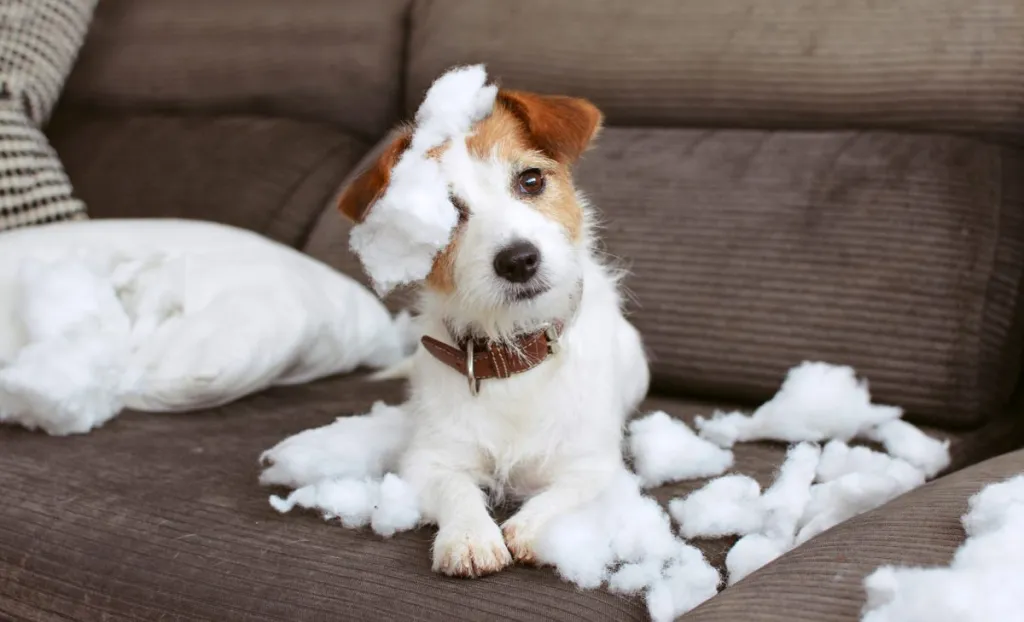You come home to find your slippers chewed to bits or your rose bushes dug up and strewn all over the yard. Though your first thought may be that your dog is punishing you for leaving them home alone all day, these acts are never done out of spite or revenge — that’s just not the way dogs operate. Dogs do, however, find ways to occupy themselves in the absence of toys and social interaction, so it’s important to provide plenty of appropriate forms of amusement before your pup comes up with their own.
Causes
Like many undesirable canine behaviors, destructive habits usually develop because a dog is bored, lonely, or both. It’s not fair or realistic to expect your dog — especially a working breed — to spend long hours quietly sitting and waiting for your return. By nature, dogs are curious and sentient beings. Ensure your pup has enough mental and physical stimulation to minimize the impulse to dig and chew.
How to Treat the Problem
Digging
- Give your dog plenty of attention. If you’re away for more than a few hours at a time, hire a dog walker or consider dog daycare.
- Tire your dog out. Make sure they receive daily walks, play fetch with them, teach them to catch a Frisbee. Most dogs require a substantial amount of exercise, and they become antsy or anxious when they don’t get enough.
- Consider channeling your dog’s drive to dig. Provide them with a “legal” digging area — a small portion of the yard (away from the rose bushes) where they can dig to their heart’s content. Cover the area with sand or dirt and bury treats and toys there to entice them to begin digging. When you find them mining in an “illegal” area, immediately interrupt them, show them to the appropriate spot, and praise them for digging in the right place.
- If possible, limit your dog’s access to areas where they’re prone to dig — or at least make them as unappealing as possible.
Chewing
- If you catch your dog chewing something they shouldn’t, interrupt them with a firm “Uh-uh!” and take the object away. Immediately replace it with an appropriate toy and praise them as soon as they begin chewing on it.
- Teach your dog to “leave it” — a training tool you can use not only when you want them to leave your slippers alone, but to make sure they back away from the chocolate bar on the coffee table or that freshly painted park bench.
- Consider applying a non-toxic spray with a scent dogs find repellant to the object of their desire.
How to Prevent the Problem
Digging
- Make sure to keep your dog busy — provide plenty of interesting toys, and rotate in new ones regularly.
- Create a puzzle. Stuff a Kong with peanut butter and then freeze it for several hours before letting your dog go at it.
- Provide adequate shelter, since often dogs will dig holes simply to shield themselves from sun or wind.
- Keep your dog indoors. (Assuming you don’t have a sandbox inside your home, this is your most effective tactic.)
Chewing
- Set them up for success. If you’ve got a sock chewer, don’t leave any around the house. They don’t know the difference between those expensive ski socks you bought last night and the faded pair with holes that your kids have outgrown.
- Make sure there are plenty of appropriate chew toys around, and vary the types so that your dog has several to choose from at any given time.
- Keep your dog mentally and physically engaged. Frozen Kongs, treat treasure hunts (“hiding” treats around the house), lots of opportunities to play, and plenty of daily exercise all help stave off unwanted behavior.
Most destructive behavior is born out of boredom. Abundant attention from you — plus ample mental and physical stimulation — will keep your dog content, fulfilled, and less inclined to dig or chew.









